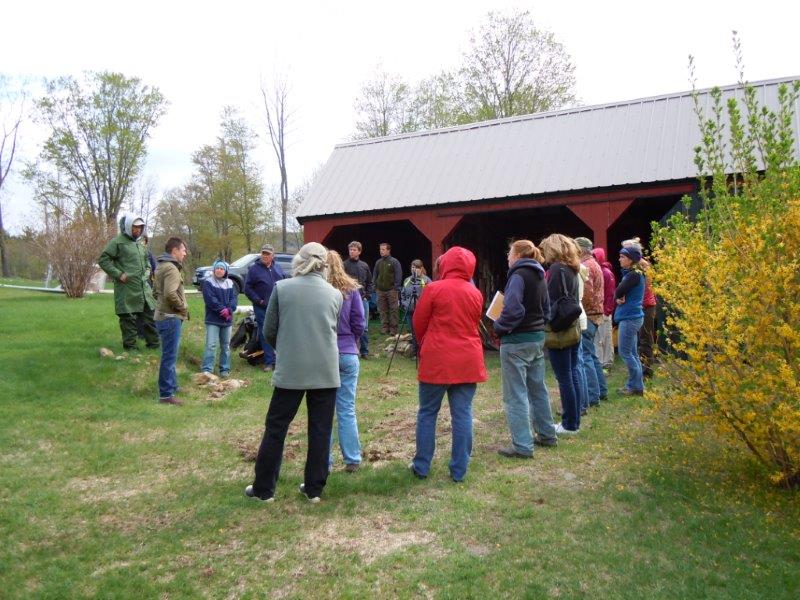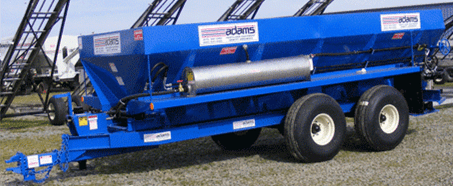Geo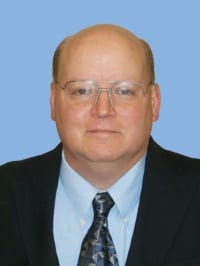 rge Faran joined the RMI team in June as our Operations Assistant. In this role, George is responsible for the daily dispatch of the company’s truck fleet. This includes scheduling generator pickups and end user deliveries. Prior to joining RMI George worked for our next door neighbor MegaPrint as a production manager. George has extensive work experience in public safety including fire and police dispatch, and is a talented saxophonist playing in local community bands. If you go to a game at the Plymouth State University ice arena you will likely see George operating the Zamboni machine. George earned an Associate’s Degree in Fire Protection at NH Vocational-Technical College in Laconia and a BS Degree in Business Administration at Plymouth State University, New Hampshire. rge Faran joined the RMI team in June as our Operations Assistant. In this role, George is responsible for the daily dispatch of the company’s truck fleet. This includes scheduling generator pickups and end user deliveries. Prior to joining RMI George worked for our next door neighbor MegaPrint as a production manager. George has extensive work experience in public safety including fire and police dispatch, and is a talented saxophonist playing in local community bands. If you go to a game at the Plymouth State University ice arena you will likely see George operating the Zamboni machine. George earned an Associate’s Degree in Fire Protection at NH Vocational-Technical College in Laconia and a BS Degree in Business Administration at Plymouth State University, New Hampshire. |
|
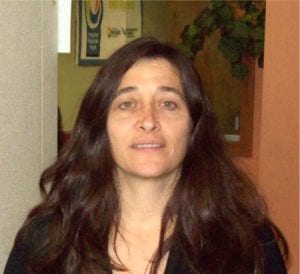 Maria Feraco is RMI’s new Full Charge Bookkeeper and Office Manager and the company’s newest employee having come on board in August. Prior to joining RMI, Maria worked at Speare Memorial Hospital in Plymouth as a Staff Accountant. Maria earned her degree in Science of Accounting at Mass Bay Community College. In her new job Maria is charged with a full scope of bookkeeping responsibilities, including processing billing, running employee payroll, and maintaining the various company accounts. Maria also works with the office staff who handle the myriad of administrative tasks necessary to keep the company going, ranging from handling mail, answering phones and keeping sales and delivery documents in order, to orchestrating today’s Annual Fall Harvest Pig Roast. Maria Feraco is RMI’s new Full Charge Bookkeeper and Office Manager and the company’s newest employee having come on board in August. Prior to joining RMI, Maria worked at Speare Memorial Hospital in Plymouth as a Staff Accountant. Maria earned her degree in Science of Accounting at Mass Bay Community College. In her new job Maria is charged with a full scope of bookkeeping responsibilities, including processing billing, running employee payroll, and maintaining the various company accounts. Maria also works with the office staff who handle the myriad of administrative tasks necessary to keep the company going, ranging from handling mail, answering phones and keeping sales and delivery documents in order, to orchestrating today’s Annual Fall Harvest Pig Roast. |
|
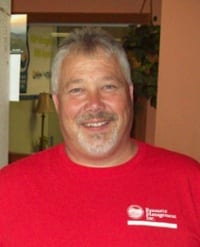 Bill Wight joined our Delivery Team focused primarily on operating the company’s roll-off truck. Bill’s experience ranges from operating in the North Country timber business south all the way to Daytona, FL. In his non-work time you can find Bill enjoying everything NASCAR, especially the races at the track in Loudon, not too far from his home. Bill Wight joined our Delivery Team focused primarily on operating the company’s roll-off truck. Bill’s experience ranges from operating in the North Country timber business south all the way to Daytona, FL. In his non-work time you can find Bill enjoying everything NASCAR, especially the races at the track in Loudon, not too far from his home. |
|
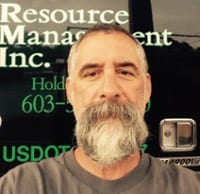 Mike Paterson joined RMI at the end of June as our Over-the Road Driver. In this role, Mike serves a route ranging from eastern Massachusetts, north through NH and VT, and west into eastern NY State. Mike’s estimated 2.5 million miles of truck driving includes extensive experience hauling timber in and from the forests of Maine, Vermont and New Hampshire. Mike Paterson joined RMI at the end of June as our Over-the Road Driver. In this role, Mike serves a route ranging from eastern Massachusetts, north through NH and VT, and west into eastern NY State. Mike’s estimated 2.5 million miles of truck driving includes extensive experience hauling timber in and from the forests of Maine, Vermont and New Hampshire. |
Blog
Organic Matter Build
RMI has completed another organic matter build on fields at Five Point Farm using RMI’s FiberBuild, which consists of short paper fiber. These fields in Northfield, MA are owned by Fish and Game and are adjacent to the Connecticut River. The soils in the area are sandy and very low in organic matter. “You want to be between 6 to 8 on your OM scores” Chris Cooper, RMI’s Certified Crop Advisor explains. “These fields were scoring around 1.”
Organic matter in topsoil serves several important functions — it influences the release of nutrients over time, enhances the water-holding capacity of the topsoil and improves soil structure. As organic matter breaks down, it slowly makes nutrients like nitrogen and phosphorus available to the crop. Increasing the water holding capacity of topsoil improves drought resistance and helps prevent the loss of nutrients through leaching. Erosion resistance is enhanced by the cellulose in FiberBuild, which assists with slope stabilization and minimizes run-off in storm events.
The land application of FiberBuild is accomplished with the use of conventional agricultural equipment.
Managing Habitat for Pollinators
May 14th was a perfect example of why you need to be tough to live in New England. It was 50 degrees outside and overcast with a crisp breeze that made it feel more like 40. New England farmers brave this weather, preparing for the growing season while there’s still snow on the mountaintops. So too native pollinators are diligently working despite New England’s challenging climate. You wouldn’t see honey bees, a Mediterranean species, pollinating in 50-degree weather. Nope, you need a pollinator made of tougher stuff, a pollinator like one of our native bumble bees. As I learned at the Managing Habitat for Pollinators on Farms workshop I attended that chilly day, native bees are perhaps our most important pollinators in cool northern climates. Because of their importance to the stability and sustainability of local farms, there is concern over the decline of native bees and attention being given to aiding in their recovery.
As Eric Mader of the Xerces Society explained, honey bee decline in the United States has received a great deal of press recently. Fewer flowered landscapes, insecticides, parasites, and an aging population of commercial bee keepers have all contributed to a 50% loss in the number of managed honey bee hives within the US since the 1950s. However, the honey bee species itself is not in significant peril. The honey bee is an imported species; although honey bee populations have declined dramatically in the US, it’s numbers are still fairly resilient within its native range. The same cannot be said of native pollinator populations.
There are roughly 50 native bumble bee species in North America well-known to researchers, including the dozen species that call New England home. A quarter of these North American bumble bees are undergoing population declines. In New Hampshire “one of our formerly most common species the rusty-patched bumble bee, Bombus affinis, is on the brink of extinction and very well could disapper from the world this year or next”, Mader warned. Adapted for the cold, wet weather of New England springs, native bumble bees are “disproportionately important as pollinators for crops”, Mader stated, “and to lose them from the landscape around us is an alarming issue.”
Considering the decline of other once-common pollinators, the decline of native pollinators comes as no surprise Mader elaborated. The number of monarch butterflies in North America has declined 90 percent in past 20 years. Similarly, a study by the London Zooligal Society found that, on average, the earth has lost 50% of its wildlife populations in the past 40 years.
Mader’s message, however, was one of hope and empowerment. “We can change the situation very easily” he said, “every single person can do something and make an immediate difference in their local landscape” to restore native pollinators. To do so, organizations including the Xerces Society, New Hampshire NRCS and the NH Association of Conservation Districts are promoting three priorities for bee consevation:
1. Creating diverse pollen and nectar sources throughout the growing season – Bumble bees emerging from hibernation need large quantities of pollen and nectar from spring-clooming flowers. In mid-summer bumble bees are trying to produce new queens. Like bears, these new queen bumble bees hibernate over the winter and therefore need access to late-blooming flowers to build up their fat reserves.
2. Conserving bee nesting habitat – Though we may want to neaten our properties, Mader advocates letting “messy, unkempt” areas that can be found at the edge of farm properties remain. Large bumble bees often nest in abandoned rodent holes. Solitary ground nesters nest in sand and sandy loam and prefer heavy grass or thatched areas which reduced tillage helps maintain. Similarly wood-nesting bees use beetle bore holes in stumps/snags and pithy plants like blackberry canes to nest within.
3. Protection from insecticides – avoiding spraying a crop with a non-systemic insecticide when it’s in full bloom and in the morning-midday when bee activity is highest, for example, allows farmers to manage pests while reducing harm to wild bees Mader explained.
Interested in establishing foraging habitat for native pollinators on your property? Learn more about RMI’s Bee Project!
Spreading Resources
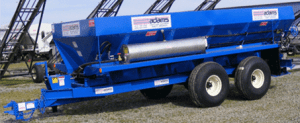
RMI has an Adams Pull Type Hydraulic Driven Litter Spreader for use by our customers within areas of Vermont and New York. The Adams spreader requires a 100 HP tractor and has a 10 ton capacity.
Additional spreader resources:
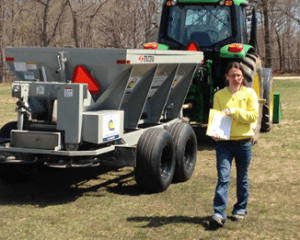 |
Rockingham & Strafford County, NH
Spreader: Stoltzfus Wet Lime Spreader |
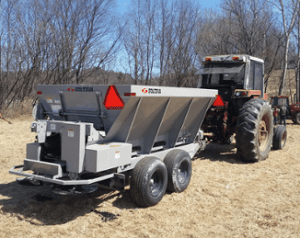 |
Cheshire County, NH
Spreader: Stoltzfus BMS Wood Ash/Lime Spreader |
Orleans & Essex County, VT
Contract spreading; terms and pricing available upon request.
Contact: Daniel Riendeau, (802) 755-6340
RMI Bee Project, Creating Habitat for Native Pollinators
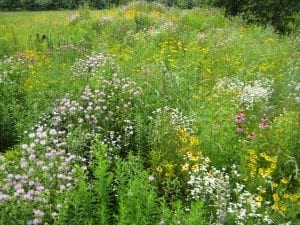
View of an established wildflower meadow
RMI is abuzz with activity! This year we’ve started our very own Bee Project to help bees, and other native pollinators, whose numbers are suffering due in part to loss of habitat. Our goal is to establish and grow wildflower meadows as bee foraging habitat beginning with a meadow at our office in Holderness, NH.
RMI based the siting of our bee meadow on research from the University of New Hampshire Cooperative Extension, the Northern New England Pollinator Working Group and the Xerces Society. Many bees native to New England nest on the edge of fields in the ground, dead trees or hollow stems of plants. The distance these bees can travel to feed is largely determined by their body size – the smallest bees can fly about 50 feet, others can fly miles to find flowers. To create a bee meadow you need an open area with one or more forested edges protected from pesticides/pesticide drift. Our native bees can use all the habitat they can get so the bigger the bee meadow the better. However, budget, space and management constraints must be taken into consideration. Bees respond faster to smaller dense plantings of wildflowers than large sparse plantings. The bee meadows must also be mowed annually to allow the wildflowers to thrive. Because of this RMI is placing our bee meadow close to the treeline on our property in a long continuous strip that will allow the bees to travel the furthest distance.
Before seeding a wildflower meadow, you must first smother any existing vegetation. Two common smothering methods are solarization and/or the application of herbicides. Solarization uses greenhouse plastic film placed on the ground to “bake” the soil. However greenhouse plastic can cost upwards of fifty cents a square foot and the solarization method requires an entire summer season to take effect. For those wishing to establish a larger bee meadow, the cost and labor associated with the solarization method can be prohibitive. Similarly, many people interested in establishing a wildflower meadow do not wish to use herbicides on their property. RMI is using a new smothering technique in the creation of our meadow applying our NutraSoil manufactured topsoil to smother our lawn. Using NutraSoil is a cost-effective and less labor-intensive option that avoids the need for herbicide!
RMI is collaborating with municipalities, conservation districts, and other local partners in NH, VT and MA to establish their own bee meadows. Want to participate in RMI’s Bee Project? Give us a buzz!
New to The RMI Team Brandy Ames & John Lahey
|
|
A graduate of Cornell University, Brandy has received degrees in Dairy Science and Agricultural Business. Prior to joining RMI, Brandy worked as a Horticultural Farm Inspector for the New York Department of Agriculture and Markets. Brandy’s diverse agricultural experience also includes having lived and worked on her family’s farm, as well as on fruit and dairy farms throughout New England. Brandy will be working closely with RMI’s agricultural customers in New Hampshire, western Maine and eastern Massachusetts.
Cell: (603) 481-1568 |
|
A graduate of the University of New Hampshire and the Maine Compost School, John brings a unique set of skills and a focus on waste stream diversion, composting and beneficial use in the industrial and municipal markets. John will be working directly with partners in New England and New York providing cost-effective, environmentally-sound Cell: (603) 520-2877 |
 |


